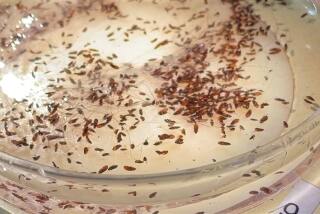Iguanas Are Linked to Severe Bacterial Infection : Health: County officials say the lizard and other reptiles, through their droppings, can pass on salmonella to some handlers. Symptoms can include diarrhea, abdominal pain, fever and nausea.
- Share via
Orange County health officials issued a warning Thursday that contact with iguanas and other pet reptiles can cause salmonella, a bacterial infection.
Iguanas are blamed for eight local cases of salmonella in 1993, officials said, leaving victims with diarrhea, abdominal pain, fever and nausea. Two children stricken with the infection required hospitalization.
“We want to get this information out because it shows, rather conclusively, that there is some risk associated with owning this animal,” said Dr. Richard Evans, Orange County chief veterinarian.
Two other people became sick with salmonella after contact with an exotic frog and a snake, Evans said.
The health warning comes amid a boom in popularity of pet reptiles, which have grown in demand as youngsters embrace the dinosaur craze fueled by the film “Jurassic Park.”
Reptile droppings are believed to be the primary infection route. Even minimal or indirect contact with reptiles can cause infection, said Dr. Hildy B. Myers, the county’s director of disease control and epidemiology.
In some cases, the illness occurred after a victim visited a home with a reptile, and, in one instance, the infection came after someone touched an iguana displayed in a pet shop, records show.
The primary health danger is to young children, frail senior citizens and anyone who has an immunity system weakened by a medical condition or medication, Myers said. In rare cases, salmonella can lead to serious complications, overwhelming infection and even death.
Evans said people can become infected by salmonella from the feces when they handle the creatures and then touch their food or mouth.
Evans said he met with Los Angeles County, state and federal officials last week to discuss the growing evidence that iguanas and other pet reptiles are salmonella threats. A rash of cases has been documented in other states, including Utah and New York, Evans said.
For now, health officials said they are planning more research into the extent of the problem, along with alerting the public. “People need to know that they need to be careful,” Evans said. About 1.6 million iguanas, which are imported from Central American countries, are in the country, according to U.S. Fish and Wildlife Service statistics. Evans estimated there are 3,000 to 5,000 of the lizards in Orange County.
“They have become extremely popular, more so than you would believe,” he said.
Steve Rook, manager of the Petland pet shop in Huntington Beach, said he has never heard of salmonella being linked to the creatures during his experience handling and selling lizards.
“That’s new information to me,” Rook said. “We send home 15 to 20 iguanas a week, and so far, in my 15 years doing this, I have never heard of that happening. I handle them myself everyday.”
The strain of salmonella linked to local lizards will rarely cause the reptiles to become ill themselves, and seldom will the animals exhibit symptoms, Evans said.
Safety Concerns
A rash of salmonella cases caused by pet iguanas and other reptiles has prompted county health authorities to warn pet owners against the dangers. Salmonella infection may cause nausea, abdominal pain and fever. Some precautions to consider:
* Risk to others: Do not keep reptiles as pets in homes with infants and young children, senior citizens and people who have medical conditions that weaken the immune system.
* Clean hands: Thoroughly wash hands after any contact with reptiles, including handling the animal or cleaning or touching its cage.
* Keep it caged: Keep reptiles in a cage or otherwise out of areas where droppings may be difficult to detect or remove, such as behind furniture, in areas with rugs or carpets or in children’s rooms.
* Getting help: For more information about reptiles or other animals that might pose health risks, call county veterinarian offices at (714) 935-6931. For information about salmonella or human illnesses caused by animals, call the county disease control office at (714) 834-8180.
Source: Orange County Health Care Agency
More to Read
Sign up for Essential California
The most important California stories and recommendations in your inbox every morning.
You may occasionally receive promotional content from the Los Angeles Times.










